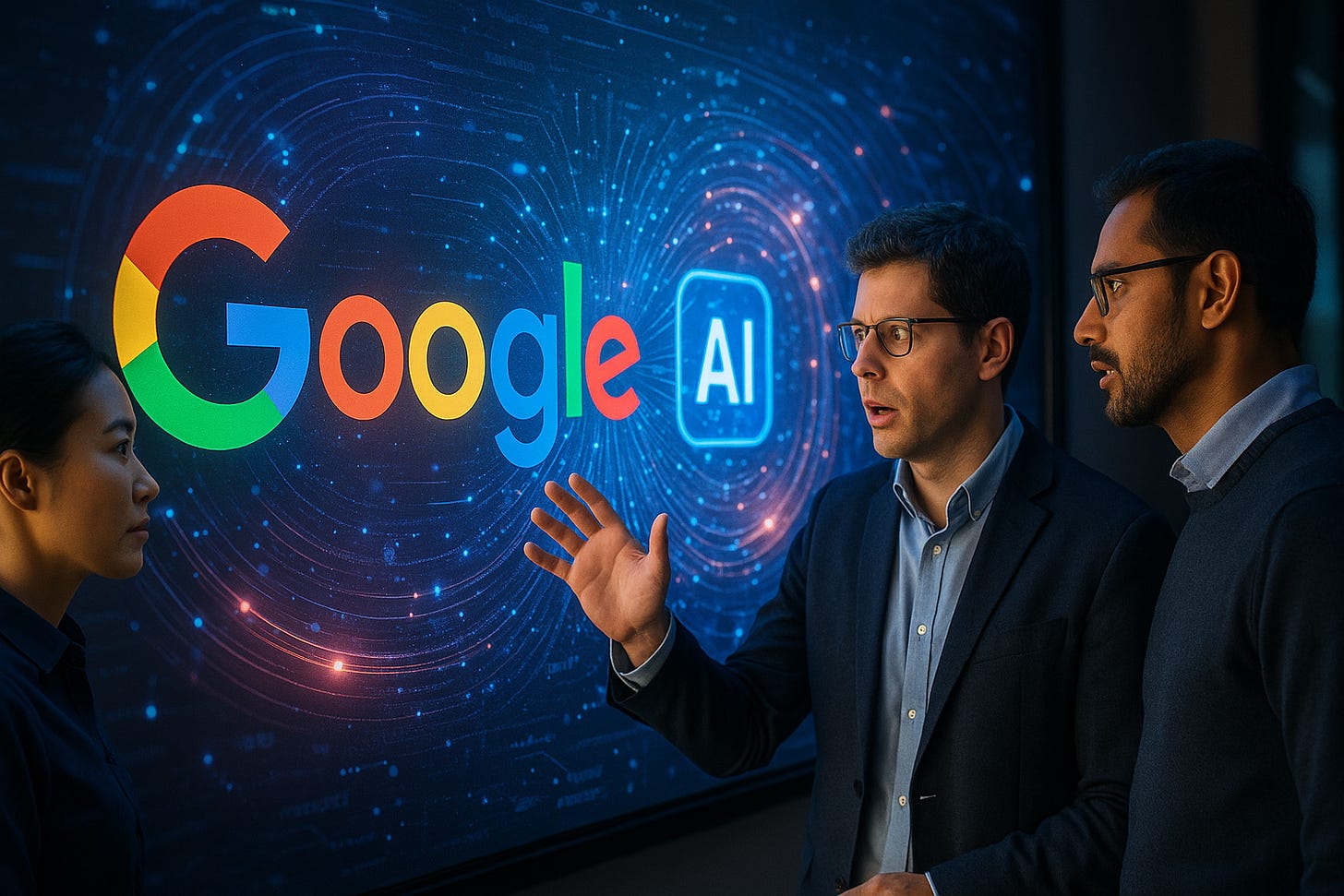🚀 Big Throttle: Sundar Pichai (Google) Takes the Lead in the AI Race 🏁
😊 With Gemini 2.5 Pro, Video Overviews, Flow, Project Aura, and its new smart glasses, Google is flooring the accelerator on innovation and redefining how we work and communicate
When Sundar Pichai steps on stage and unveils a wave of jaw-dropping announcements, it’s clear Google isn’t idling in neutral: they’ve stomped on the gas in the race for AI leadership. In a historic moment when rivalry among the “Fantastic Seven” — from OpenAI and Microsoft to Meta and Amazon — constantly reshapes the market, Google I/O 2025 delivered a true show of authority. Each demo of Gemini 2.5 Pro conquers new ground (from deep reasoning to natural conversation), and with tools like Video Overviews, Flow, and the highly anticipated Project Aura glasses, Pichai not only answers Sam Altman’s OpenAI push but also leaves any Apple laggard in the dust. For users, this battle is great news: more power, more creativity, and pricing — like the AI Ultra plan at $250/month — that proves consumer AI has moved beyond the lab and become a driving force in our daily lives.
A showcase of technologies that mark a before and after:
Video Overviews: Text to Video
With Video Overviews, Google turns any document into an interactive explainer video, complete with auto-generated narration and dynamic infographics. This tool speeds comprehension and multiplies Android’s value as a mobile work platform.
AI Ultra Subscription at $250/mo
For the most demanding users, Google launches AI Ultra, a $249.99/month plan offering priority access to Gemini’s most powerful models and advanced features like Deep Think, Gemini 2.5 Pro’s new deep-reasoning mode.
Gemini 2.5 Pro and Flash: Next-Level Conversational AI
The latest Gemini, in Pro and Flash editions, includes Deep Think, a reasoning engine that can plan, contextualize, and execute complex tasks — from scriptwriting to full project plans.
AI Mode and DeepSearch: Search Reborn with AI
Search’s “AI Mode” natively integrates Gemini, enabling conversational queries and DeepSearch, which filters and organizes results with advanced logic and guaranteed relevance.
Project Beam (formerly Starline) and Flow: Immersive Communication
Google Beam debuts 3D capabilities for immersive video calls in partnership with HP on its first device. Meanwhile, Flow, powered by Veo 3 and Imagen 4, cements its status as the most powerful AI video-creation tool to date.
Android XR and Project Aura: The Return of Glass
The dream of Google Glass is reborn with Android XR and Project Aura glasses (built with Gentle Monster and Warby Parker), integrating Gemini for everyday tasks — from real-time translation to step-by-step navigation on display.
Jules and NotebookLM: AI as Coding Companion
Jules promises to make you the world’s best programmer with zero prior experience, complemented by the NotebookLM app (now on Android and iOS), which directly competes with ChatGPT by offering intelligent summaries and on-demand code generation.
Project Astra: Proactive, Context-Aware Assistants
Gemini steps closer to “universal AI” with Project Astra, which gives the assistant proactive capabilities based on context, search history, and future needs — from reminders to trip planning.
This suite of launches not only multiplies Android’s value but also demonstrates Google’s renewed drive to lead AI innovation. Faced with the unstoppable advance of Gemini and its applications, competitors — from OpenAI to the “Fantastic Seven” — must react faster than ever.
🤖 Microsoft Isn’t Far Behind: Build 2025 Highlights 🏷️ Microsoft Powers the Agent Web with Copilot and NLWeb
Custom, Multi-Agent Copilot
At Build 2025, Satya Nadella introduced Microsoft 365 Copilot Tuning, letting companies train models on their own data in a low-code environment, plus multi-agent orchestration so multiple bots collaborate on complex tasks in Copilot Studio.
NLWeb: Turn Any Site into a Conversational App
The new NLWeb protocol makes it easy to build natural-language web interfaces, letting traditional pages answer human-language queries and act as personalized user agents.
Open-Source WSL and Windows AI Foundry
Microsoft fully open-sourced the Windows Subsystem for Linux (WSL), inviting community contributions, and announced Windows AI Foundry, an environment for natively deploying AI agents and models in Windows 11.
Photoreal Copilot and Deeper Integration
Copilot in Windows now generates photorealistic images for docs and presentations, while new agents in Edge and File Explorer offer AI actions — from summarizing text to removing photo objects — without leaving the native interface.
[This article is also translated into Spanish, Catalan, French, and Italian.]



